A Textile Trip To Peru
I am glowing after an unforgettable, 10 day experience to Peru with my littlest one - Dominic. I was given an opportunity to learn the traditional Andean textiles from a group of amazing artisans in the area of the Sacred Valley, just outside Cusco.
August 29th - September 1, 2019
SETTLING IN
After a full day of travelling from San Francisco, California to Cusco, Peru, Dominic and I stepped into an oasis of healing gardens that would be our home for the first three days of our 10 day trip.
The gardens at Willka T'ika provided a place of serenity and inspiration, where each meal was thoughtfully sourced from the vegetable garden on the property and so tastefully prepared, the room was quaint and cozy and the staff felt like family.
Once we acclimated and recovered from our travelling, our first adventure was to Chinchero - a pueblo well-known for textiles. We visited Tupay - Andean Textile Center where the founder, Maragerita, and her daughter, Mariluz, warmly welcomed us and made us at home while we watched their process of washing wool, spinning, dyeing and weaving in the courtyard of their home.
While visiting their Textile Center, a rain storm hit. Silly me was not prepared - open toed Birkenstocks, no sweaters for either of us or hats. They realized this and quickly led me to their covered porch and bundled us in beautiful, warm textiles while handing me a cup of hot tea. Dominic became fussy and they took us in as though I was part of their familia. Cold and wet, I felt grateful and warm in a way I don't feel very often.
They insisted I needed a manta (blanket) to keep warm on our walk back through town to the bus. They showed me an assortment of mantas, but I hesitated to spend a good part of my budget on a piece I wasn't instinctively drawn to just to stay warm. Mariluz sensed my hesitation, and disappeared for a moment. She then reappeared with a gorgeous, well-worn manta that I instantly felt connected to. The edges were frayed, and it smelled like dirt, fire and sweat - a homely, comforting smell. Maragerita had naturally dyed and wove it when her son was a baby. He is now a teen.
This is what I would bundle myself and Dominic in for the trek back to where we staying, and my choice of baby wearing for the duration of the trip.
September 1 - 3, 2019
NATURAL DYEING
Our stay in Urubamba at Willka T'ika came to an end, where we then headed to the first stay of our Tintes y Textiles Retreat organized by Aula Artesana. Nunu Boutique Hotel is nestled in the Sacred Valley in a town called Lamay, perfectly located for our first official workshop of natural dyeing with Pichinku Yarns.
We spent the evening around the fire, a glass of wine in hand, getting acquainted with each other. Everyone in the group comes from a creative background of some sort - some muralists, potters and photographers, and we all shared a desire for this cultural experience.
By morning, we were all eager to begin our day of natural dyeing. We wandered towards the river to forage a plant called chillca, that we would later prepare and use to make a mint green dye. After filling our bags, we headed to the working studio of Pichinku Yarns. Here we prepared various plant materials for dyeing, and began the extraction process.
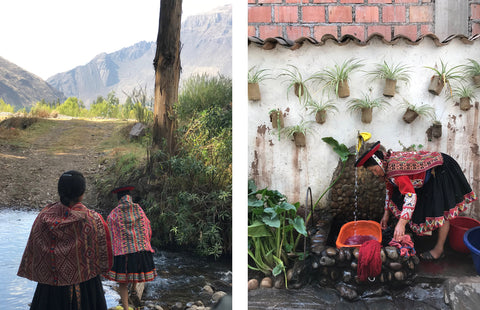
There's something so healing about touching the plants with your bare hands, taking respectfully what you need to bring new life in the form of color to a fabric/yarn.
Throughout the day we dyed wool yarn using cochineal (red), nogal - also known as black walnut (brown), kinsa kuchu (sage green), kaka sunka (orange), q'olle (yellow), and chillca (mint green).
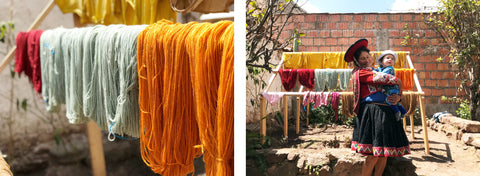
We then enjoyed one of the most scrumptious picnic lunch along side the river with a beautiful view of the mountains. During lunch, I had an overwhelming feeling of joy and realization that I was sitting in a place with women and men that are rich with history and culture.
Back at the Nunu Boutique Hotel, Dominic and I enjoyed the cool breeze as the evening awoke, in the festive hammock just outside our room.
September 4 - 6, 2019
SHEARING + SPINNING
We then embarked on our next adventure to the high mountains of the Andes where the Alpaca were awaiting us. We were invited by the people of Patacancha to experience and participate in a sacred ritual of the alpacas. They outfitted us in their beautiful mantas, skirts and hats and we followed along in a dance and sacrifice in preparation for shearing. We then were given the opportunity to shear a few strokes of fiber, if we so desired. And I was ALL on board for that! They use a knife and their two hands. Nothing fancy. The simplicity of their methods made it approachable, eliminating the fear I often associate with shearing an animal.
Then off to Señor Juan and Señora Elena's home to practice our hand at spinning on a drop spindle. The women made yarn with such ease and quickness. They spin nearly at all times of the day and throughout many of their other tasks. They were excited to show us this skill! Once we became sufficient at spinning, a woman lay out a beautiful assortment of hand spun and naturally dyed yarns that we could choose for our back strap weaving.
WEAVING
We choose our colors, and paired up with a weaver. Four sticks with sharpened ends were hammered in the ground as our frame for weaving and the warping process began. It took me a moment to find the rhythm and understand their process, but by the end of the day I had developed a sense of what we did and why. The day concluded and we headed down to Ollantaytambo for the night - the main town at the base of Machu Picchu.
The following morning, we made the trek back up the mountain to Patacancha where we continued to work on our weavings. (Come see my weaving in person at the studio!)
For lunch, we had a pachamanka meal. Pacha means earth and manka means oven. The food is put into a hole in the ground and then covered with dirt and a blanket until it has cooked.
Best. Meal. Ever.
Following lunch, we headed back to our back strap looms for the final stretch of weaving and finishing. And then... the goodbyes. A bittersweet moment of gratefulness and sadness. Though it was only two days, and there was a language barrier, somehow a bond was created.
As we walked back down the hill to our awaiting vehicle, I stopped for a moment. I looked up at the sky and felt a rush of emotions come over me. I held Dominic close to me as I turned and looked back at where we had spent the last two days connecting with a beautiful community. I took a deep breath, smiled and continued on. I will be back.
REFLECTING AND RELAXING
With the fiber part of the retreat over, it was time to relax and soak in the 3 immersive days of the Andean ways of textiles. Hot tub in a forest? Day trip to the famous Maras Salt Mines? Yes please! The perfect end to an amazing trip.
TAKEAWAYS
As I've sat with this experience I feel so honored that we were invited into the communities where they were excited to show us their ways of spinning, dyeing and weaving. Since my return, when sharing my experience, I've been asked, "But don't you know how to do all of that already?" Each region has unique ways and relationships with how they make their textiles. Learning the Andean traditions of textiles was simply amazing, but more than that, I am thankful that I got to spend time in a community that is so different, yet so similar to mine. We speak different languages, wear different clothes, our upbringings are much different, yet we all have a love and appreciation for fiber and an eagerness to share with those who want to learn!
A huge thank you to Sonya and Steph of Aula Artesana, and all of their collaborative partners for making this happen! <3

-Alisha and Dominic
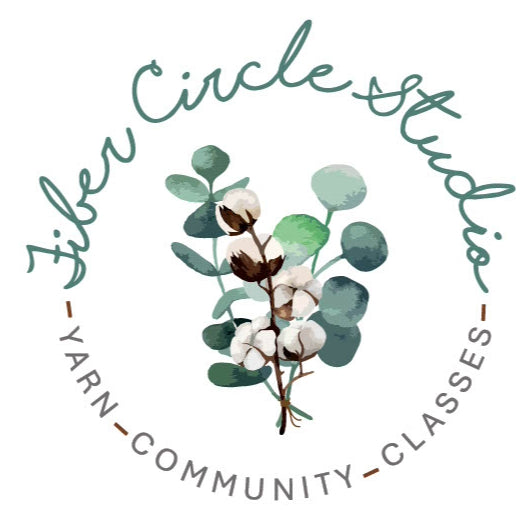

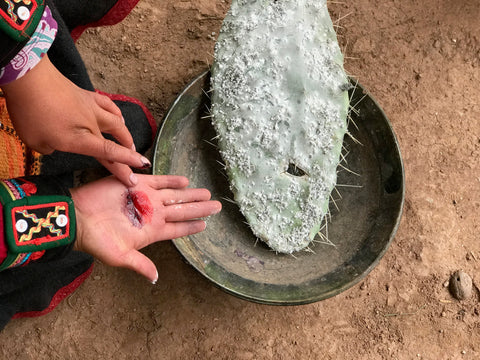



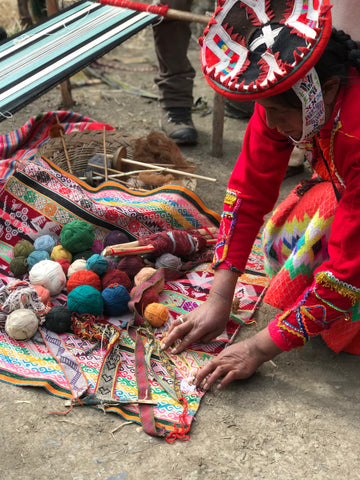
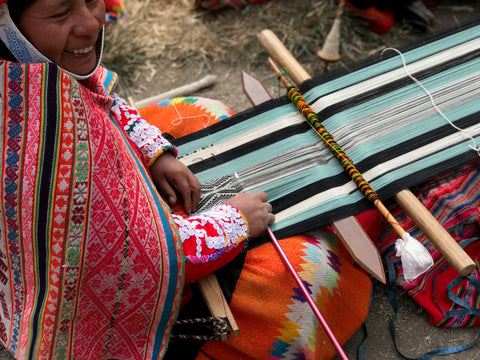

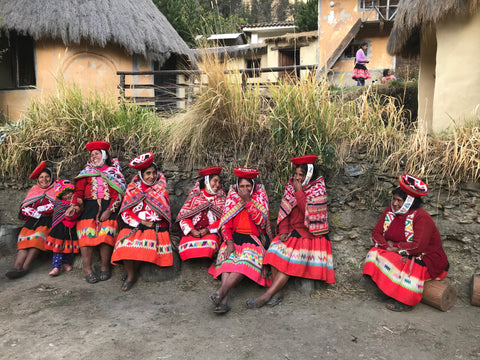
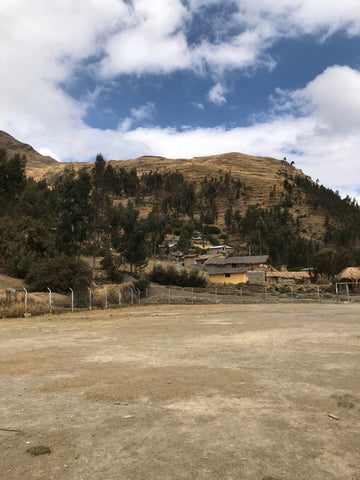
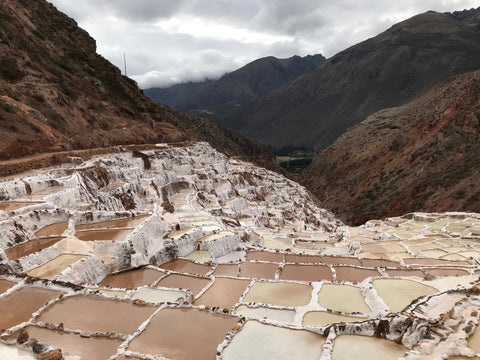
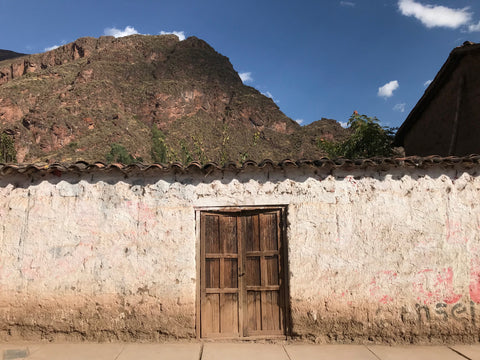
1 comment
You said YES.
Beautiful baby, beautiful Mama. Thank you for sharing your experience – brought tears to my eyes.
The people, the clothing, the fiber, the Love! Beautiful.
I appreciate your care in the details, creating connections for us. Word of the day, Beautiful.